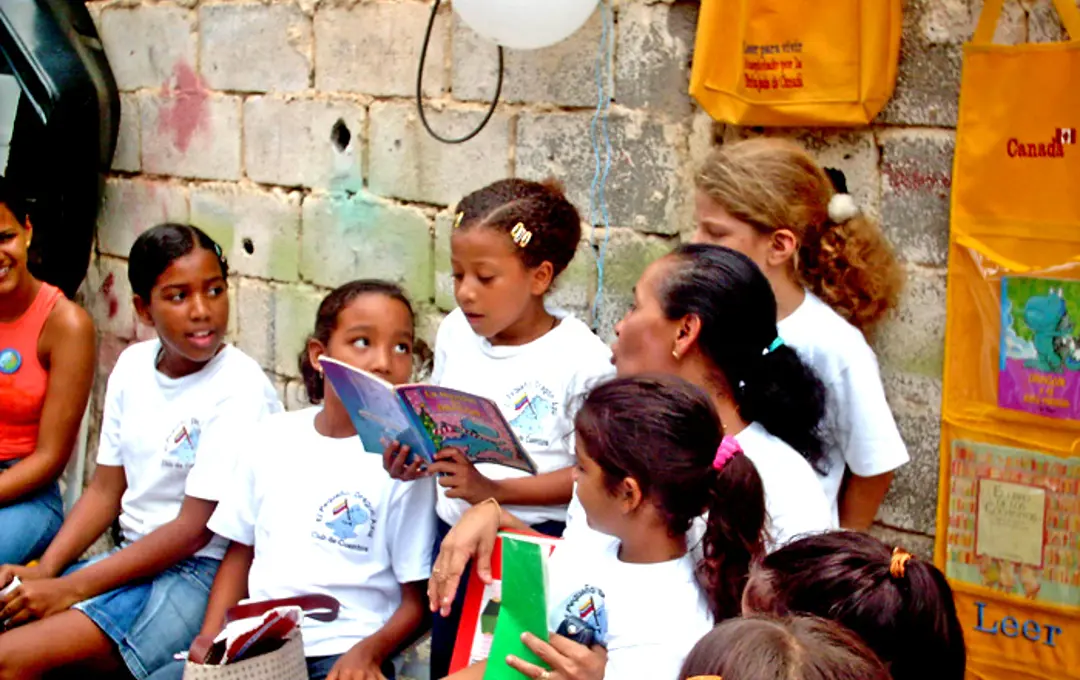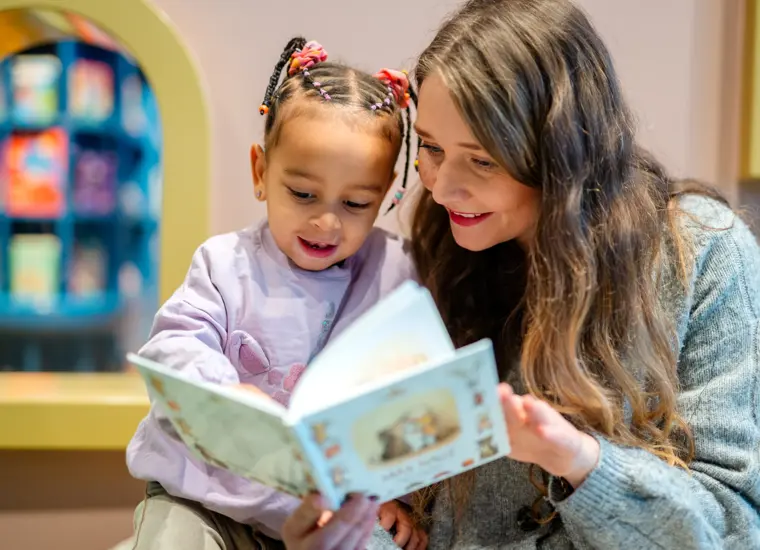Pioneering spirit in in shanty towns and mountain villages
Banco del Libro is a non-profit institution headquartered in Caracas, Venezuela. It was set up in 1960 as a centre for the exchange of textbooks – hence the name, which means Book Bank. Since then, with great creativity and flexibility, Banco del Libro has grown and branched out to promote reading in Venezuela, in every conceivable arena and genre of children’s literature.
 Photo: Banco del Libro
Photo: Banco del LibroQuick facts
The jury’s motivation
In a true pioneering spirit, with ingenuity and a sheer determination, the Banco del Libro has constantly sought new ways of disseminating books and promoting reading among children in Venezuela. Enthusiasm, professionalism, closeness to the children and a refreshing lack of bureaucracy are the hallmarks of the Banco del Libro’s work, whether in shanty towns, mountain villages, universities or out in cyberspace.
For almost half a century, the Banco del Libro, through its many and various projects, has passed on books and stimulated an appetite for reading and writing among countless numbers of children and young people. They have also constructed model libraries, started up school library networks, founded a publishing company specialising in children’s literature and published magazines and other publications.
Banco del Libro runs Latin America’s biggest documentation centre for children’s literature and functions as a nursery for young researchers, authors, illustrators and others. The Institution has made a lasting impact on the world of children’s literature in Venezuela, and its work has inspired many successors in Latin America and other parts of the world.
In this interview from 2019, you meet Banco del Libro's Director Maria Medina. The interview was conducted in 2019.
In mountain villages and cyberspace
This text was written in 2007 by members of the award jury.
Imagine a man and a mule struggling up a twisty mountain path. One of the mule’s saddle bags is packed with books while the other contains a portable computer. The only way of reaching the most isolated villages of the Andes is on foot or by horse or mule. The Bibliomulas are just one of the many adjustments to reality that are characteristic of the Banco del Libro. Today, the mules serve not only as ambulant libraries but help to put the villagers in touch with modern technology and means of communication – the four-footed library assistants have become cybermulas.
From the institution’s office in the capital of Venezuela, Caracas, it’s not far to the shanty towns, which surround the city centre. However, the Banco del Libro reaches much further than this; it promotes reading and brings books to inaccessible, far-off places all over the country by finding local partners and creating distribution structures using any form of conveyance that may be suited to the job. To access the vast, flat farming regions, the staff of Banco del Libro either flie or spend many hours travelling by car along extremely poor roads. For transports to communities in the Amazon that can only be reached by water, book boats, or bibliofalcas, ply the Orinoco river.
It started with a book bank
The story of Banco del Libro begins after the fall of the dictatorship in 1958. In an effort to improve the standard of the country’s educational system, a group of volunteers initiated an exchange programme for used textbooks as a means of support for the large proportion of the population who lacked sufficient resources. This initiative gave rise to the institution’s name, Banco del Libro, or Book Bank. The Canje exchange service, which started up in 1960, still plays an important role: between 2000 and 2005, the service exchanged 25,000 textbooks, resulting in significant savings for the families of schoolchildren. In the same year, 1960, the Banco del Libro’s initial, basic objective was formally adopted: to support the reconstruction of the country’s educational system, to improve the standard of teaching materials and to promote reading among children and young people.
Over the following decade, the Banco del Libro made extensive efforts to develop better text books: they organised seminars, catalogued textbooks and formed evaluation criteria; they built up school libraries in Caracas and other parts of Venezuela and also designed the public library Mariano Pícon Salas in Caracas, which was to become a model for the Venezuelan public library system. The libraries and library networks created by the Banco del Libro during this period were eventually taken over by the growing public library system and Ministry of Education respectively – the Banco del Libro initiated and set up one platform after the other for the dissemination of books to children and young people.
Better books for more children
In 1978, in an effort to boost the practically non-existent amount of good-quality fiction for children and young people, Banco del Libro founded its publishing wing Ediciones Ekaré. Today, Ekaré is one of the world’s foremost Spanish-language publishers of children’s literature and has now been cut loose from the Institution and is run as an independent business.
In 1980, to stimulate the national production of children’s books still further, Banco del Libro instituted the award Los mejores libros para niños (Best Books for Children). A few years previously, in 1976, Banco del Libro opened Venezuela’s first children’s bookshop, which is still run in the institution’s premises in Caracas. This is also home to the documentation centre, which was founded in 1974. The first of its kind in Latin America, the centre has served as a central hub for the development and dissemination of children’s literature across the entire continent and has served as a model for several other countries. The documentation centre now has a library of more than 20,000 books for children and young people and a collection of 10,000 other documents for researchers and students.
The Banco del Libro works in numerous different ways to create reading environments and bring together people and books. In the seventies, they initiated home-based libraries such as “La Urbina” in barrio Petare, and in 1968 they started a mobile library bus service for low-income areas such as Caracas’ huge shanty towns. They also visited prisons – and were amused to note that the only objects taken from the prison by a few escaping inmates were the books they had loaned from the travelling library!
One of the children who every Tuesday afternoon sat in the square in barrio 23 de Enero in Caracas waiting for the mobile library bus to show up was Victor Diaz, who now works with the design and production of exhibitions for museums.
In the 21st century
Banco del Libro’s activities have changed since its start-up nearly fifty years ago. For example, teaching materials are no longer part of the agenda. However stimulating an appetite for reading and improving children’s accessibility to books are, of course, still the main concerns. During the first five years of the 21st century, initiatives by the Banco del Libro have substantially increased the number of children’s libraries in Venezuela: 33 new libraries in 24 states. Several new projects have been started, including Tendiendo puentes con la lectura (Building Bridges with Books) and De la lectura a la escritura (From Reading to Writing) in three of Caracas’s poorest areas. Another project is Le@mos, which teaches children and teachers from schools in low-income districts how to use the Internet and CD-ROM discs.
Mobile libraries are an important ingredient in one of the Banco del Libro’s ongoing projects: with its three buses, Refréscate Leyendo (Refreshing Reading) reaches some 30 schools in Caracas and 11 states all round the country, offering workshops for teachers and librarians, story-time sessions for children, and book donations.
The Institution has about 30 employees and a mix of ages and professions that is highly conducive to development – Banco del Libro has an ability to break down barriers at practically all levels. Employees engaged in editorial duties or theoretical courses also participate directly in the various Banco del Libro projects: they come along on the book boat, help transport loudspeaker equipment for reading sessions in the Caracas barrios, or form part of the staff on the mobile libraries.
“Amongst all the professional experiences that I have had in my life, few have been as rewarding as to know and enjoy the magnificent work of Banco del Libro (Venezuela). This exemplary institution has been able to combine, with singular skill, the rigor in each one of its professional projects. All of these projects are touched by the undeniable social vocation of its staff – which has a special way to be, a style in the relations with people, that I consider to be a true art.”
Antonio Basanta Reyes, Executive Vice President and
General Director of the Foundation Germán Sánchez Ruipérez
Read to live
A close appreciation of reality is essential, and Banco del Libro’s approach to adjusting its projects to local needs and conditions is entirely pragmatic. It was after the catastrophic floods in the State of Vargas in 1999, when thousands of people drowned, homes were destroyed and many children were orphaned, that Banco del Libro developed its Leer para vivir (Read to Live) scheme. This was the first Latin American experience of bibliotherapy, the use of literature as a tool to relieve the individual and communal trauma that a natural catastrophe entails.
Leer para vivir is one of Banco del Libro’s most significant contemporary projects; it was awarded the IFLA’s Guust van Wesemael Literacy Prize and has served as a guide for other countries like Colombia, El Salvador and, after the tsunami, Thailand. The project is also a prime example of Banco del Libro’s ability to make a community or a city district take over the responsibility for a project. The book loaning system and book clubs started in 2000 are still run by volunteers living in Vargas. The fact that the original club members, now university students, return and talk about books with their younger siblings and the neighbourhood children bears witness to the profound effect that Leer para vivir has had.
“Everything big that happened in the world happened first in someone’s imagination, and what tomorrow’s world will look like depends to a large extent on the imaginative powers of those who are just now starting to learn to read. That’s why children need books.”
The words are Astrid Lindgren’s. Banco del Libro has the same belief in the significance of books. Their entire operation is founded on the notion that reading plays a central role in the emotional, intellectual and social development of children and young people. María Beatriz Medina, Banco del Libro’s managing director, talks about books as a key, a door to society and the rest of the world – “We believe that books can bring about change”. Even though Venezuela enjoys a high level of literacy, with about 93 percent of the population able to read, there are still great social and economic discrepancies and many people live in illiterate surroundings.
Research and Development
Now that the national public library system has integrated many of the institution’s pioneer projects in its own operations and the school library networks have been taken over by the Ministry of Education, Banco del Libro today, alongside its own direct efforts to promote and stimulate reading, has committed itself to research and education. To document and reproduce the experience gained, the institution works on several different levels. It documents its practical experience of running projects and publishes material on children’s and young people’s literature and other media – recommendations, reader’s guides, reports on new research, et cetera.
The institution arranges exhibitions and seminars, both national and international, and organises workshops and courses. The 150-hour course for reading promoters created by the Banco del Libro is held both at the institution itself and as an on-line course at the institution’s website. Together with the Universidad Autònoma de Barcelona and the Germán Sánchez Ruipérez Foundation in Spain, the Banco del Libro now also offers an on-line Master’s degree in children’s literature.
A winning concept
Experiments with new methods, the construction of models and the dissemination of skills and expertise are at the core and are the strength of Banco del Libro’s concept. The institution’s impact on the entire field of children’s literature in Venezuela and its significance for the development and spread of methods of stimulating reading in Latin America spring from the diversity of their activities and innovative approach, from the ability with which they implement their projects in the structure of society. And, not least, from their capacity to arouse enthusiasm and inspire people both in their own projects and in organisations for the promotion of reading all round the world.
Banco del Libro has received the following awards: IBBY’s ASAHI Reading Promotion Award 1988 and IFLA’s Cuust van Wesemael Award 2003. Says Patricia Aldana, President of IBBY:
“The Banco del Libro is a world class institution in its rigorous commitment to quality, the depth of knowledge and commitment of its staff, and its vital outreach to its community. […] The Banco is one of the few institutions in the world that have actually changed children’s literature and created generations of readers to love this literature."
Like Pippi Longstocking, we have embarked on countless adventures. We have used knapsacks and boxes, traveled in bookmobiles, boats, and fiber optic, always in the quest of defending children’s right to have books.

Discover our laureates
The Astrid Lindgren Memorial Award is awarded to authors, illustrators and narrators, but also to people or organizations that work to promote reading.
Find out more about the laureates
Children have the right to great stories
To lose yourself in a story is to find yourself in the grip of an irresistible power. A power that provokes thought, unlocks language and allows the imagination to roam free. The Astrid Lindgren Memorial Award was created in 2002 by the Swedish government to promote every child’s right to great stories.
Find out more about the award